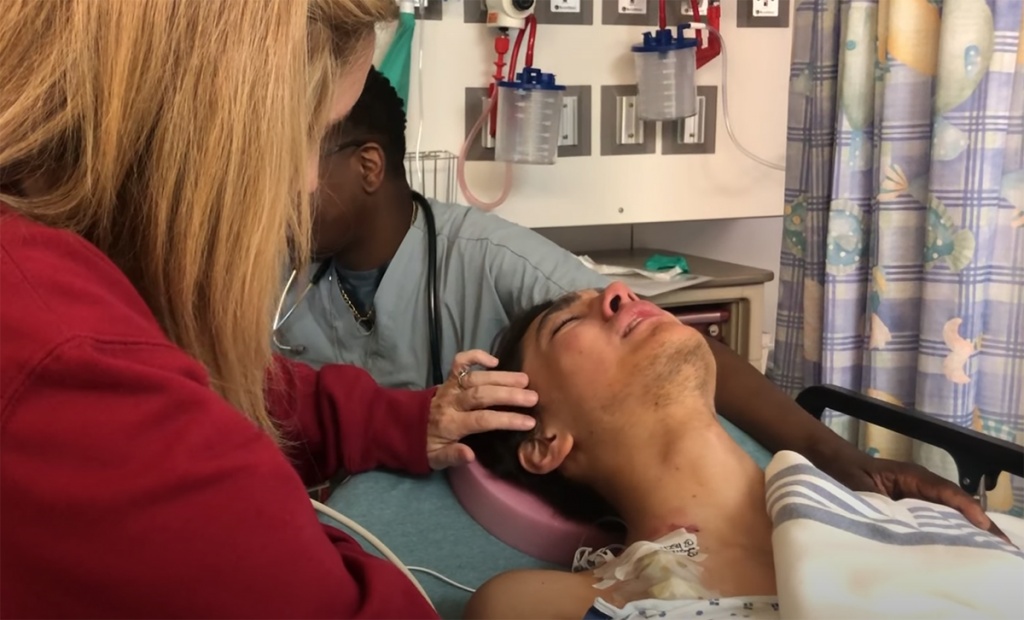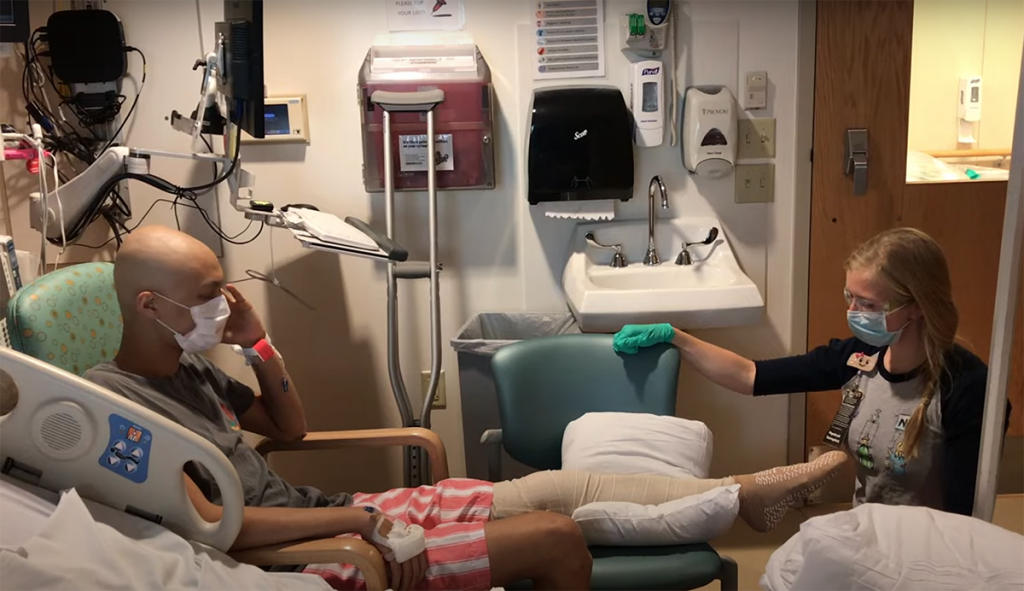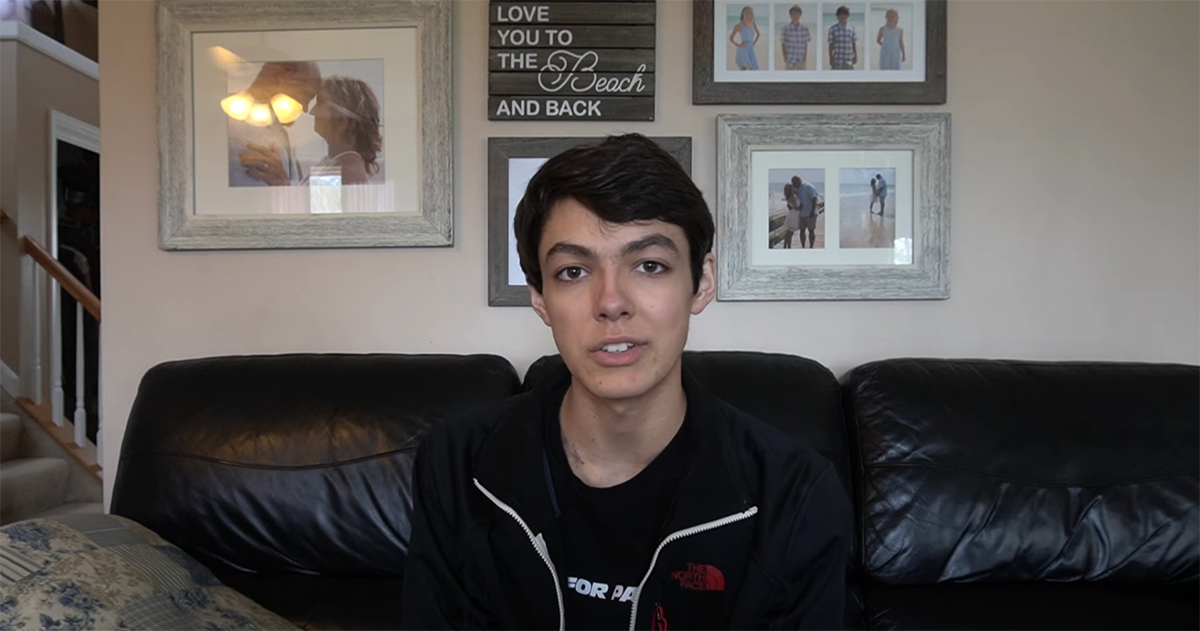What Kind of Cancer is Sarcoma?
- This Lebanon, Ohio, teen always dreamed of being a filmmaker, so when he was diagnosed with osteosarcoma, he took the opportunity to document his experience.
- Brandon Morgan, 19, has released his 90-minute documentary, entitled 30 Weeks. The title is derived from the 30 weeks he spent fighting cancer during the Covid-19 pandemic.
- Sarcomas are cancers that arise from the cells that hold the body together. They can occur in muscles, nerves, bones, fat, tendons, cartilage or other forms of connective tissues.
- There are hundreds of different kinds of sarcomas, which come from different kinds of cells. The word sarcoma refers to a large array of bone and soft tissue cancers.
Now, Brandon Morgan, 19, has released his 90-minute documentary, entitled 30 Weeks. The title is derived from the 30 weeks he spent fighting cancer during the Covid-19 pandemic. He was just 17 years old at the time.
Read MoreBrandon's Osteosarcoma Diagnosis
During Brandon's junior year of high school, he began experiencing "excruciating" pain in one of his knees. His doctor first thought it was tendonitis, which is when a tendon is inflamed.
But the pain only got worse, so doctors at Cincinnati Children's Hospital had to tap in to figure out what was wrong. And what they discovered was that Brandon's knee pain wasn't tendonitis, but osteosarcoma.
"When we got a call from Cincinnati Children's (Hospital) saying they think there's a tumor in there, we were completely shell shocked," Brandon said.
He began chemotherapy shortly after his diagnosis.
"I was put through machine after machine, getting scanned to establish baselines once I started chemo," he said in the film, which is now live on YouTube. "The weight of the situation still hasn't hit me yet. They also introduced me to my port. This is the device that would be surgically placed in my chest to administer the chemo."
The chemotherapy caused hair loss, which he admitted made him struggle with his appearance.
"It will be dark, and I'll sit up, and I'll see my reflection outside on the glass and feel like I'm looking at somebody else," Brandon said in the film.

However, the true test of his courage was undergoing knee surgery to remove the osteosarcoma.
"That morning was the first time I felt genuinely scared for my life," he said in the documentary as hospital staff wheeled him into the operating room. "I cried on my way back to the operating room. They put me to sleep with tears rolling down my cheeks because I knew when I woke up, everything would change, and I prayed to God it was for the better."
And Brandon got his wish! His surgery was a success.

"Before I knew it, it was back to school," he said. "I honestly can't say I remember all that much about what it was like being in school again and seeing everyone, probably because I wasn't at school all that much."
"I was still in chemo four to five days out of the week, but I was able to do some things like, I don't know, being crowned homecoming king."
Earlier this week, Brandon returned home from the University of Central Florida (where he's studying film, obviously), to have additional scans to check on his health.
"I got the results and they were all crystal clear which was some of the best news ever," he told WLWT, a television station in Cincinnati, Ohio.
What Kind of Cancer is Sarcoma?
Sarcomas are cancers that arise from the cells that hold the body together. They can occur in muscles, nerves, bones, fat, tendons, cartilage or other forms of connective tissues.
Related Video: Sarcoma survivor Kara Ladd finds solace in reiki, meditation and energy healing during her cancer treatment.
"There are hundreds of different kinds of sarcomas, which come from different kinds of cells," Dr. George Demetri, director of the Sarcoma and Bone Oncology Center at Dana-Farber Cancer Institute and Harvard Medical School, previously told SurvivorNet.
The word sarcoma refers to a large array of bone and soft tissue cancers. Those are then further broken down into more specific forms of the disease, including:
- Ewing's sarcoma Cancer that typically occurs in and around the bones, often in the arms or legs, or the bones of the pelvis. It most commonly occurs in children and young adults.
- Kaposi sarcoma Rare type of cancer that causes lesions on the skin, in lymph nodes, organs and the mucous membranes of the mouth, nose, and throat. It typically affects people with compromised immune systems, such as those with HIV.
- Epithelioid sarcoma Soft tissue cancer that grows slowly. It's likely to begin under the skin of areas like the finger, hand, forearm, lower part of the leg or foot.
- Synovial sarcoma Known also as a malignant synovioma, this is a cancer that can form soft tissues such as muscle or ligaments, commonly close to joints or in areas like the arm, leg or foot.
- Osteogenic sarcoma Known also as osteosarcoma, this cancer forms in the bone and is most common in young children.
- Spindle cell sarcoma Rare form of the disease that accounts for less than 2% of all primary bone cancer cases. It's most common in adults over age 40 and often forms in the bones of the arms, legs and pelvis.
- Angiosarcoma This cancer appears in the lining of the blood vessels.
- Liposarcoma This cancer develops from fat cells and often occurs in the torso, limbs or deep within the abdominal lining.
- Chondrosarcoma This cancer occurs in the cells of the cartilage, mostly in adults over the age of 40.
Related: Bold, Bald & Beautiful: Kara Ladd Met a New Version of Herself After Her Cancer Diagnosis
"Unfortunately, most sarcomas don't cause many of the symptoms that may be associated with other cancers," Dr. Dale Shepard, director of the Cleveland Clinic Taussig Cancer Institute Phase I and Sarcoma Programs, previously told SurvivorNet. Shepard also explained that this often leads to large tumors at the time of diagnosis.
"Soft tissue sarcomas are typically painless," he added. "Bone sarcomas may be mistaken for orthopedic injuries. A mass the size of a golf ball or larger and growing should be evaluated as a potential sarcoma. It's important that patients who do have symptoms are not dismissive of them."
Learn more about SurvivorNet's rigorous medical review process.


